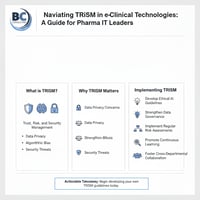The evolution of AI is happening at a breakneck pace and its impact on data integration in clinical...
AI Transformations in Clinical Supply Chains: 2024 Trends You Can't Ignore
The clinical supply chain is the unsung hero of healthcare, quietly ensuring that life-saving medications and trial materials get where they need to be. Yet, despite its critical role, this industry is trailing behind when it comes to adopting artificial intelligence (AI). While AI holds the promise of revolutionizing how we manage clinical supplies, the reluctance to embrace these innovations is creating a gap – one that could compromise efficiency, security, and patient safety.
Bryan Clayton recently addressed this issue at the California Regional Investigational Supply Professionals Meeting (CRISP), hosted by Steve Jacobs of Global Biopharma Solutions (GBS). In this post, we’ll explore six key AI trends poised to shake up clinical supply chains in 2024. Whether you’re involved in logistics, compliance, or operational strategy, these are the advancements you’ll need to get ahead of.
1. AI-Driven Predictive Analytics and Blockchain Integration: Time to Modernize
Imagine being able to predict shortages before they happen or knowing the exact moment to replenish critical trial supplies. That’s the promise of AI-driven predictive analytics – yet many companies are still using outdated methods that can’t keep up with today’s demands.
Predictive analytics can forecast demand, optimize inventory, and enhance logistics, ensuring that medications and trial materials are always where they need to be. But it doesn’t stop there. Blockchain, an often underutilized technology in this field, offers unparalleled transparency and traceability. When AI is layered on top of blockchain, it becomes a watchdog, ensuring product authenticity and preventing counterfeit drugs from reaching patients.
The combination of AI’s predictive power and blockchain’s traceability can also enhance regulatory compliance and patient safety, two pillars critical to the clinical supply chain. Failure to adopt these technologies isn’t just a missed opportunity – it’s a risk to patient trust.
2. Data Privacy and Compliance: The Elephant in the Room
As AI becomes more embedded in clinical supply chains, the issue of data privacy looms large. In a world where sensitive patient information is at stake, ensuring airtight data protection isn’t optional – it’s essential. But many companies are falling short.
Adopting best practices for data privacy means embracing data minimization – collecting only the necessary data and ensuring transparency about how that data is used. Companies must implement secure storage and transfer protocols, restricting access to sensitive information to only those who need it. Furthermore, regular audits and comprehensive compliance training for employees are essential in building a culture of data privacy within organizations.
To support this, many companies have implemented enterprise-level instances of Azure with Azure Open AI and other similar enterprise AI models. These platforms help enforce stringent data privacy policies by walling off sensitive data from broader model training processes. By using enterprise-grade AI services, companies can keep their data secure, ensuring that sensitive clinical information stays private and protected from external access. These systems allow organizations to leverage AI without compromising on security and compliance standards.
In an era of increasingly complex regulations, companies that don’t prioritize compliance are setting themselves up for breaches or fines that could damage both their reputation and bottom line.
3. Multimodal AI: More Than Meets the Eye (or Ear, or Nose)
When we talk about AI, it’s easy to get stuck on the idea of chatbots or robots. But multimodal AI – technology that integrates multiple sensory inputs like sight, sound, smell, touch, and even taste – offers entirely new possibilities for healthcare.
In clinical supply chains, multimodal AI could revolutionize quality control. Imagine AI systems equipped with electronic noses that can “smell” contamination in trial materials, or visual AI that can detect defects in medical products before they leave the factory. Haptic technology that delivers touch feedback could also improve the handling of delicate materials during transportation. These advances would lead to higher quality standards and significantly reduce risks during clinical trials.
Despite its transformative potential, the clinical supply chain has been slow to adopt these innovations, leaving room for significant improvements in efficiency and patient safety.
4. Model Training and Privacy Controls: Addressing the Trust Gap
AI models like ChatGPT improve through continual learning, but in a clinical environment, privacy concerns have slowed their adoption. Understandably, companies worry about sharing sensitive data for model training. However, advances in granular privacy controls now allow companies to benefit from AI without sacrificing data security.
The clinical supply chain industry can take advantage of these new controls, which provide better customization and opt-out options for data usage. With new safeguards in place, organizations can harness AI's potential to streamline supply chain operations while remaining fully compliant with privacy regulations. This addresses the longstanding trust gap that has hindered AI adoption in clinical settings.
5. Machine Learning, NLP, and Data Analytics: The Core of AI’s Power
At the heart of AI advancements are machine learning (ML), natural language processing (NLP), and data analytics. These technologies form the backbone of modern AI, allowing it to learn from past data and generate new insights. Yet, the clinical supply chain sector hasn’t fully tapped into their potential.
ML enables systems to improve over time, adapting to complex environments and reducing human intervention. NLP enhances communication between humans and systems, making tasks like inventory management and regulatory reporting more efficient. Meanwhile, predictive and prescriptive data analytics offer actionable insights for decision-making, helping companies optimize everything from supply routes to trial timelines.
By leveraging these core technologies, clinical supply chains can improve operational efficiency, reduce errors, and anticipate challenges before they arise.
6. Agentic AI and Autonomous Decision-Making: Automating the Future
Imagine a clinical supply chain where AI automatically monitors stock levels, places orders, and reroutes shipments to avoid delays – all without human intervention. This isn’t science fiction; it’s the future of agentic AI, and it’s already making waves in other industries.
Agentic AI can take proactive roles in decision-making, reducing human workload and improving accuracy. For instance, AI could automatically select the best shipping routes for time-sensitive trial materials or manage the entire resupply process for ongoing trials. These systems not only reduce operational costs but also increase the speed and reliability of clinical trial operations.
With this technology, clinical supply chains can become more resilient, adaptable, and efficient, making it a must-adopt trend for 2024.
Conclusion: Don’t Wait – Act Now
The clinical supply chain industry is standing at a crossroads. With AI innovations like predictive analytics, multimodal AI, and agentic systems reshaping supply chain management across industries, it’s time for clinical operations to catch up. The longer the industry waits, the more it risks falling behind – not just in terms of efficiency but in delivering safe, reliable patient care.
2024 could be the year AI transforms clinical supply chains – if the industry embraces these changes. It’s not just about keeping pace with technology; it’s about building a future where AI ensures faster, safer, and more effective healthcare delivery.
For expert advice on how AI can elevate your clinical supply chain, contact us below.



